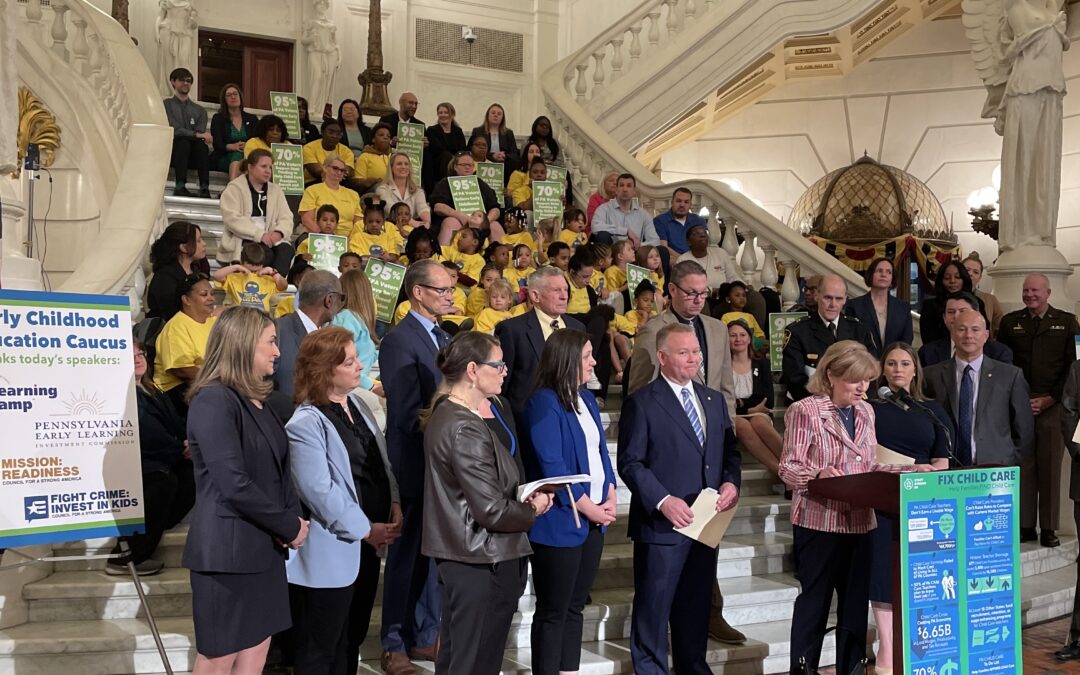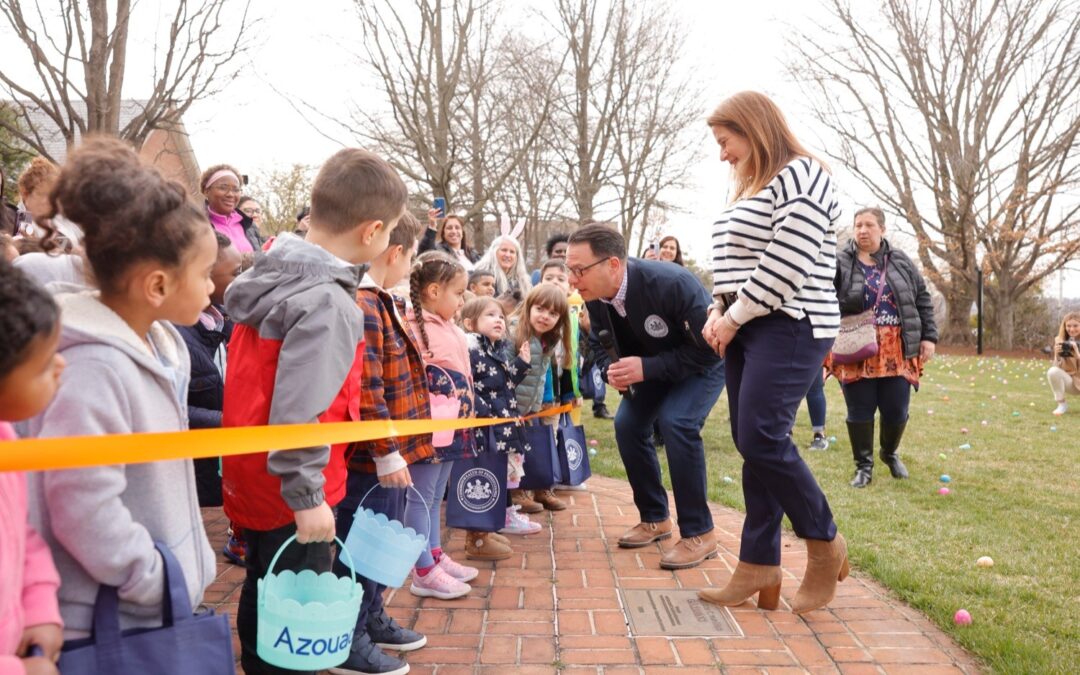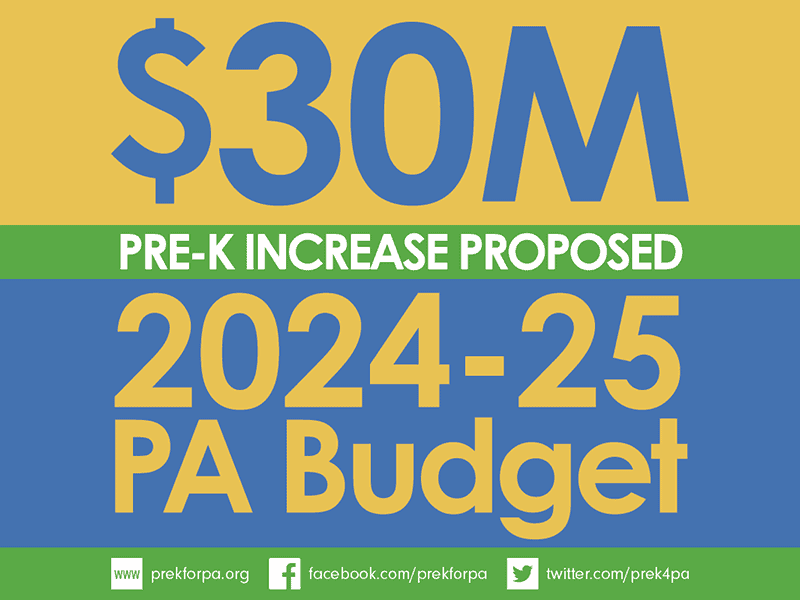
PA Legislative Latino Caucus, First Up, and Latino Educando Juntos Urge Investments Needed for Early Learning Teacher Recruitment and Retention
Warn teacher shortages will continue closing child care programs
Harrisburg, PA (May 7, 2024) PA Legislative Latino Caucus Chairman Rep. Danilo Burgos, Hispanic child care providers and families rallied today at the Capitol along with allies Sen. David Argall, Sen. Jimmy Dillon, Sen. Tim Kearney, Rep. Donna Bullock, Rep. Elizabeth Fiedler, Rep. Justin Flemming, Rep. Dane Watro, and other advocates to underscore how a growing early care and education teacher shortage, driven by low compensation, is closing classrooms and programs throughout Pennsylvania and driving up waitlists for working families.
Sen. David Argall (R- District 29) kicked off a diverse group of speakers detailing how child care and early learning are not only educational issues or family issues, but they are also part of the economy. “Child care providers have come to me and what they have told me is frightening. Businesses in my community are struggling to find workers, because families are struggling to find child care,” said Sen. Argall. “But this is not just a rural or suburban or city problem. This is a problem across Pennsylvania. There’s only one way to a solution, we have to work together.”
Ivelisse Eufracio, Owner/Director of Little All Stars Care Center in Luzerne County, opened her center with a vision to serve the Hazelton community, especially underserved Hispanic families. Unfortunately, Eufracio described her story not as one of triumph but instead as a struggle for survival, noting that not having her program at capacity impacts the community and also means she is not making ends meet to support her own family.
“My program is licensed for 32 children, but I can only safely care for eight children with my current staff. Since I opened my doors, I have been severely hindered by the lack of teaching staff.” Eufracio further explained, “factories near my program offer $18 an hour for jobs that require less training and fewer qualifications than teaching.”
Brendalis Lopez, a parent from Little All Stars proudly shared, “My child has benefited tremendously from wonderful instruction from a loving teacher who represents our home culture. I do not spend time at work worrying about my child. I love how much my child has grown in high-quality care.” Lopez pledged to stand with child care providers stating, “We all deserve to be paid in alignment with the benefits our work generates in educational gains, family stability, and economic returns. I hope that day comes soon [for child care teachers].”
Rep. Elizabeth Fiedler (D – District184) described the need for Pennsylvania to support a recruitment and retention proposal that would provide monthly payments to providers of up to $440 per child care employee for initiatives such as hiring bonuses, monthly wage increases, benefit packages, or retention bonuses for staff staying for a certain length of time or for staff achieving certain credentials or degrees.
“There are many important occupations in Pennsylvania, but I would argue that there are none more important than care professionals,” said Feidler. “I’m here today to say that as lawmakers we must do a better job of supporting this workforce. There are several states including Maine, Kentucky, and Nebraska that pay at or above the 75th percentile and have made additional investments in recruitment and retention programs for child care providers to solve this teacher shortage.”
In Philadelphia County, Damaris Alvarado-Rodriguez’s Center, Children’s Playhouse has 25 job openings and 166 children on their waiting list. “If we could pay competitive wages and fill those jobs, we could serve an additional 442 children a year,” said Alvarado-Rodriguez. “That is more than double what we currently serve.”
Alvarado-Rodriguez also cited updated data from the September 2023 Children’s Hospital of Philadelphia’s Policy Lab survey of 677 child care providers (roughly 10 percent of PA licensed providers) showing more than 3,300 open positions statewide. She noted that if their positions were filled, those 677 providers could be serving nearly 16,500 more children.
Sen. Jimmy Dillon (D – District 5), Sen. Tim Kearney (D- District 26), Rep. Justin Flemming (D – District 105), and Rep. Dane Watro (R – District 116) all agreed that fixing the early learning teacher shortage must be a priority as it impacts all communities. “It is critical to provide our early learning teachers with the necessary support to keep them in the field. This industry is overlooked, undervalued, and under supported,” said Sen. Dillon. “Child care is truly the workforce behind the workforce.”
Sen. Dillon also cited The PA Chamber of Business and Industry and the Early Learning Investment Commission’s recently conducted employer child care impact survey that underscores that labor force issues are often deeply intertwined with child care challenges. According to this survey, released in February 2024, more than 80 percent of Pennsylvania employers surveyed said they have moderate or significant recruitment and retention issues due to child care. Almost 70% of employers surveyed said it is extremely or very important to help employees meet child care needs.
Rep. Danilo Burgos, PA Legislative Latino Caucus Chairman (D – District 197) encouraged legislators to continue to work together to build bipartisan support to further invest in the early childhood education workforce to ensure programs can recruit and retain the staff they need to meet the demand for child care and pre-k services for working families. “We are here today advocating for more funding for preschool, child care, and afterschool care,” said Rep. Burgos. “It [increased investment] will show that we care about Pennsylvania’s future.”
Rep. Donna Bullock (D – District 195) described the experience of seeing her mom running her child care and how that demonstrated the importance of a quality early childhood experience and the teachers that provide that experience. “Most times, child care providers are not just working eight hours days, they are working nine, ten hours and not getting paid for it. We are paying folks more to care for a car than for our most valuable resources, our children,” Rep. Bullock stated. “We must invest in the workers that are caring for and educating our children. It is unacceptable that we are not paying child care providers as the professionals they are.”
Citing the Bureau of Labor statistics, Carol Austin, Executive Director, First Up described just how underpaid and undervalued the industry is. “Given the significant return on investment funding early learning generates, it seems fiscally irresponsible to see this crisis and do nothing, and morally reprehensible to allow people responsible for significant economic output to receive the bottom two percent of all wages. Early educators should not be told they must work for nothing so that every other family but theirs can thrive.”
Austin wrapped up the event referencing a 2023 report that shows that gaps in Commonwealth’s child care system cost working families, employers, and taxpayers about $6.65 billion annually in lost earnings, productivity, and tax revenue stating, “Investing under $500 million to stop the loss of $6 billion seems like an easy choice.”
Specific investment priorities include:
- Increasing child care subsidy rates to the 75th percentile of the current price families pay for child care services to help alleviate some of the rising facility, food, utility, and supply costs for providers participating in Child Care Works.
- Increasing Pre-K Counts rates by $1,000 per slot to help address workforce challenges and inflationary pressures and increasing the Head Start Supplemental Assistance Program’s rates by a proportional amount.
- Creating a child care teacher recruitment and retention initiative that would provide monthly payments of $440 per child care staff to providers maintaining a subsidy agreement with the Commonwealth for initiatives such as hiring bonuses, monthly wage increases, benefit packages, or retention bonuses for staff staying for a certain length of time or for staff achieving certain credentials or degrees. Such a program provides flexibility for providers to choose how to use these funds so that they can have the maximum impact in local communities. This will help alleviate the historic staffing crisis that is causing classrooms and entire programs to close and leave working families without access to child care.
###

HARRISBURG — On Tuesday, the state’s Early Childhood Education Caucus hosted a rally with child care and pre-K students, teachers and parents as well as other advocates to underscore the worsening impacts of the commonwealth’s early learning teacher shortage.
The caucus co-chairs include Sen. Pat Stefano, who represents Bedford County and surrounding areas. Also there were Sen. Judy Schwank, Rep. Pat Harkins and Rep. Shelby Labs, who are working with Stefano to build support for recruitment and retention investments that will help to remedy the teacher shortage and ensure that early learning supply can meet the demand from working families.
“This is an issue I have heard from early learning providers throughout my district,” Stefano said. “We must work together to prioritize funding to help the early learning sector attract and retain its workforce.”
“We all understand that the state of child care in Pennsylvania needs to change,” Schwank said. “Low pay for childhood educators, long waitlists and high prices for parents are just a few of the major problems we need to address at the state level, and we have an excellent opportunity to do that in this year’s budget.”
Speakers detailed how low teacher compensation fuels the shortage which leads to a growing number of child care and pre-K classroom closures, and drives up waitlists for working families.
Dr. Leah Spangler, CEO of The Learning Lamp Early Learning Centers, stated that child care in Pennsylvania is “on life support” as her organization is currently seeing 97 job openings and 546 children on the waiting list for care.
Spangler believes that with better pay leading to filled job openings, they would be able to serve an additional 1,286 children. She also noted that child care programs cannot pay wages that match those of other businesses, like convenience stores and grocery retailers, and that this causes a staff turnover rate of more than 50% annually.
“Other states have established revenue streams to better support their early learning workforce and it’s time we do the same,” Stefano said. “Though not everyone in the commonwealth has a young child at home, the aggregate effects of the early learning teacher shortage impact everyone. When a parent wants to work but cannot find child care and then needs to stay home full-time, our workforce, and thus our economy, suffers.”
Read the full article here.

HARRISBURG – Today, the bicameral, bipartisan Early Childhood Education Caucus hosted a rally with child care and pre-K students, teachers and parents as well as other advocates to underscore the worsening impacts of the commonwealth’s early learning teacher shortage.
The caucus co-chairs, Sen. Pat Stefano (R-32), Sen. Judy Schwank (D-11), Rep. Pat Harkins (D-1) and Rep. Shelby Labs (R-143), are working to build bipartisan support for recruitment and retention investments that will help to remedy the teacher shortage and ensure that early learning supply can meet the demand from working families.
“We all understand that the state of child care in Pennsylvania needs to change,” Schwank said. “Low pay for childhood educators, long waitlists and high prices for parents are just a few of the major problems we need to address at the state level, and we have an excellent opportunity to do that in this year’s budget.”
Speakers detailed how low teacher compensation fuels the shortage which leads to a growing number of child care and pre-K classroom closures, and drives up waitlists for working families.
“This is an issue I have heard from early learning providers throughout my district,” said Stefano. “We must work together to prioritize funding to help the early learning sector attract and retain its workforce.”
Dr. Leah Spangler, chief executive officer (CEO) of The Learning Lamp Early Learning Centers, stated that child care in Pennsylvania is “on life support” as her organization is currently seeing 97 job openings and 546 children on the waiting list for care.
Spangler believes that with better pay leading to filled job openings, they would be able to serve an additional 1,286 children. She also noted that child care programs cannot pay wages that match those of other businesses, like convenience stores and grocery retailers, and that this causes a staff turnover rate of more than 50% annually.
“Other states have established revenue streams to better support their early learning workforce and it’s time we do the same,” Stefano said. “Though not everyone in the commonwealth has a young child at home, the aggregate effects of the early learning teacher shortage impact everyone. When a parent wants to work but cannot find child care and then needs to stay home full-time, our workforce, and thus our economy, suffers.”
Tim Fallon, CEO emeritus of Lehigh Valley Public Media and member of the Pennsylvania Early Learning Investment Commission called child care “the workforce behind the workforce.”
He presented findings from a new employer survey from the PA Chamber of Business and Industry and the Early Learning Investment Commission showing that 80% of Pennsylvania employers surveyed said they have moderate or significant recruitment and retention issues due to child care.
“Supporting families means making sure child care is open and available across the Commonwealth,” said Labs. “We must invest in our early learning teachers now, or we will see more classrooms close in the future, which will only serve to harm our children’s development.”
Other speakers included Indiana County Sheriff Robert Fyock, a member of Fight Crime: Invest in Kids, and retired Army Lt. Gen. Dennis Benchoff, who spoke on behalf of Mission: Readiness.
Harkins referred to the business model of child care and early learning as “clearly broken” and called the Shapiro Administration’s budget proposals to increase child care subsidy a crucial step forward.
“It’s also critical that we tackle the teacher shortage side of the child care crisis head-on. Looking to other state models of how to effectively invest in recruitment and retention initiatives for the child care sector must be a top commonwealth priority,” Harkins said.
The event was held by the co-chairs in partnership with Start Strong PA, Pre-K for PA and the Pennsylvania Early Learning Investment Commission, to support of further investment in early childhood education across the commonwealth. This budget cycle, the caucus is focused on supporting the early childhood education workforce to better stabilize and meet the demand for child care and pre-K services for working families.
Click here to watch video of the event.

Harrisburg, PA (March 26, 2024) – Today, Governor Josh Shapiro and First Lady Lori Shapiro hosted high-quality pre-k classrooms from across the commonwealth at the annual Easter egg hunt at the Governor’s Residence. Preschool students from Montgomery County Intermediate Unit in Norristown, Summit Early Learning in Mifflinburg, and Touching the Future in Fleetwood were in attendance for the festivities.

MyChesCo: Shaping the Future of Pennsylvania: Examining Gov. Shapiro’s 2024-25 Budget Proposal
February 7, 2024
By: Maryann Pugh
Today, we delve into our analysis of the 2024-25 state budget proposed by Governor Josh Shapiro, an issue that is currently the focus of numerous discussions amongst Pennsylvanians and the Early Learning Pennsylvania (ELPA) coalition.
Gov. Shapiro’s budget proposal puts the spotlight on the young minds of our state, focusing significantly on pre-kindergarten programs and aiming to tackle the pressing matter of a historic teacher staffing shortage. With nearly $33 million allocated towards state-funded pre-K programs, the Governor’s office aims to alleviate inflationary pressures that pre-K providers grapple with while navigating the seemingly unending teacher shortage.
However, the ELPA coalition paints a concerning picture with pre-K classrooms closing throughout the commonwealth due to inadequate wages. These circumstances are forcing pre-k teachers to vacate their chosen field for higher-paying roles in other sectors. The fresh investment planned by the government is undoubtedly a critical initial step towards overcoming this issue.
While these initiatives are commendable, there’s a dire need for future investments to handle the teacher shortage and ensure the potential 87,000 eligible preschoolers in Pennsylvania receive the quality early education they need.
Another cornerstone of the proposed budget is increased rates for subsidized childcare, a move applauded by Start Strong PA. The hike in reimbursement rates aims primarily to support child care providers grappling with escalating costs and a worsening teacher shortage. States like Maine, Florida, Kentucky, and Nebraska have shown the way by investing in recruitment and retention programs to stabilize their child care systems, and Pennsylvania may need to follow suit.
The budget proposal also includes an increase in funding for Early Intervention programs, which work with children who have developmental delays. This funding is a crucial step in ensuring all children with developmental delays can receive the help they need, regardless of their family’s income.
However, the proposal has raised concerns among the Childhood Begins at Home campaign, which expressed worries about a potential cut in funding for home-visiting services due to the expected loss of one-time federal stimulus funds, and effects of federal sequestration on discretionary spending.
While Gov. Shapiro’s proposal outlines important advances in early childhood education and support, many advocacy campaigns believe further steps must be taken to fully address Pennsylvania’s child care and pre-K teacher shortage, and ensure the future generations of our state are afforded the quality early education they so rightly deserve.
Read the full article here.









